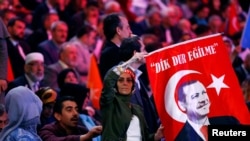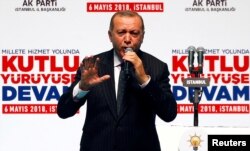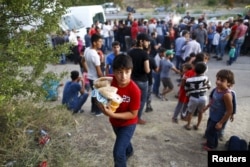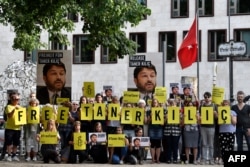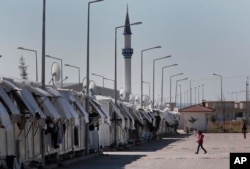Turkish President Recep Tayyip Erdogan unveiled his election manifesto this week for June’s snap parliamentary and presidential elections.
Pacing the stage of an Istanbul sports stadium filled with flag-waving members of his Justice and Development Party, or AKP, the Turkish leader included in his expansive to-do list a pledge to usher in an era of greater democracy and social justice.
His record in government, however, belies his social justice pledge, say civil society leaders and analysts. They fear Erdogan will crack down even harder on non-governmental organizations — if, as seen as likely, he’s re-elected.
Turkey is switching from a parliamentary system to a presidential one and a re-elected Erdogan will have even more sweeping executive powers.
“Erdogan will become head of state, head of government, head of the police, head of the army and head of the ruling party,” said Soner Cagaptay, an analyst at the Washington Institute, a research organization. “He will become the most powerful Turkish leader since [Republic of Turkey founder Mustafa Kemal] Ataturk, and in some regards more powerful.”
A study published last week accused Turkey of leading the way in the past two years in silencing and closing NGOs in a region that’s already one of the darkest spots on the globe when it comes to philanthropic endeavor. The authors of the Global Philanthropy Environment Index ranked Turkey as the 72nd least favorable "philanthropic environment" out of all 79 countries they studied, with only Vietnam, Venezuela, Zimbabwe, Belarus and Qatar being considered more hostile toward civil society.
The index, which was published annually by the Hudson Institute until 2015 and is now overseen by the Lilly Family School of Philanthropy at Indiana University, noted that more than 1,100 NGOs have been shuttered by the Turkish government since 2016.
The researchers warned of “new pressures on foreign NGOs attempting to support re-settled Syrian refugees in southern Turkey.”
In a report last month, Amnesty International warned “those who are defending human rights [in Turkey] are on the front line.” The rights group demanded the release of civil society activists, including Taner Kılıc, the head of Amnesty’s Turkish branch, who has been detained by Turkish authorities for alleged terrorist activities since June of last year.
“Under the cloak of the state of emergency, Turkish authorities have deliberately and methodically set about dismantling civil society, locking up human rights defenders, shutting down organizations and creating a suffocating climate of fear,” argues Gauri van Gulik, Amnesty International’s Europe director.
Amnesty estimates that 1,300 NGOs have been closed in the past two years: among them leading social justice groups, including child rights organization Gundem Cocuk and a dozen women’s rights organizations. The rights group says the impact on civil society has been “immense” and “deliberate” with survivors of gender-based violence, refugees, and migrants hit particularly hard.
Erdogan allies say the criticism is unfair and that Turkish state authorities, in coordination with NGOs, have mounted a “legendary effort” to assist more than 3.5 million Syrian refugees who have fled to Turkey.
They say NGOs which have been shuttered and civil society figures who were arrested have ties either with Kurdish militants or the Muslim cleric Muhammed Fethullah Gulen, who denies allegations he was the "mastermind" of a failed 2016 military coup..
Among them is U.S. pastor Andrew Brunson, who is on trial on terror and spy charges and faces up to 35 years in prison if convicted in a trial that resumed Monday.
Turkish authorities allege that Brunson, whom U.S. President Donald Trump has described as a “fine gentleman,” aided the outlawed Kurdistan Workers’ Party, or PKK, and aimed to carve out a Christian Kurdish mini-state in Turkey. Brunson says he never engaged in politics.
The charges against him have been criticized by analysts as implausible.
Relations between international NGOs and Erdogan’s government have been especially fraught since the Syrian conflict started eight years ago, aid workers say. “The government has never wanted us in the country,” said an international aid worker.
The registration process has become more onerous and Ankara has been strict about regulations governing what NGOs can do, where they can go and where they can dispatch aid.
The United Nations refugee agency has been blocked frequently from aiding Syrian refugees, who are living outside official camps, U.N. officials say.
Ankara has blocked international aid agencies from working in a Turkish-controlled zone carved out in northern Syria, preferring to work with Turkish NGOs favored by Erdogan, many of which are Islamist in ideology. A year ago, the Turkish government revoked the registration of Mercy Corps, one of the world’s biggest humanitarian nonprofits, forcing it out of the country.
Just days before Erdogan called the snap election, one of his top advisers, İlnur Cevik, accused international NGOs of working to help Kurdish secessionists, naming the Catholic Relief Services, Danish Refuge Council, World Vision, International Rescue Committee, and the Norwegian Refugee Council, among others, of acting as “espionage outfits” for foreign governments. “That doesn’t augur well for civil society groups after these elections,” said a European diplomat based in Istanbul.




